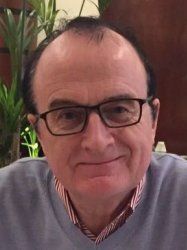Anthony Barrett facts for kids
Quick facts for kids
Anthony Gerard Martin Barrett
FRS FMedSci
|
|
|---|---|
 |
|
| Born | 2 March 1952 |
| Nationality | British, US |
| Alma mater | Imperial College London |
| Scientific career | |
| Institutions | Northwestern University, Colorado State University, Imperial College London |
| Doctoral advisor | Derek Barton |
| Doctoral students | Matthew Fuchter |
Anthony Gerard Martin Barrett is a brilliant British chemist. He is a professor at Imperial College London, a famous university. He leads the Wolfson Centre for Organic Chemistry in Medical Science. This center focuses on how chemistry can help medicine. He became a member of the Royal Society in 1999. He also joined the Academy of Medical Sciences in 2003. These are very important groups for scientists. He studied at Imperial College London, earning his first degree in 1973 and his PhD in 1975.
Contents
Early Life and Education
Anthony Barrett grew up in Exeter, England. He went to Heles Grammar School there. After school, he attended Imperial College London. He earned his first degree with top honors in 1973. He then completed his PhD in 1975. For his PhD, he worked with Sir Derek Barton. Sir Derek Barton was a Nobel Prize winner.
Career and Important Discoveries
Professor Barrett started his career at Imperial College London. He became a lecturer in organic chemistry in 1975. Organic chemistry is the study of carbon-based compounds. In 1983, he moved to the United States. He became a full professor at Northwestern University. Later, in 1990, he moved to Colorado State University.
After ten years in the US, he returned to Imperial College London. He became a special professor of organic chemistry. He also became the head of the Organic Section. In 1999, he was named the Sir Derek Barton Professor of Synthetic Chemistry. This title honors his former teacher.
New Chemical Reactions
Professor Barrett has invented many new chemical reactions. These reactions help scientists create new molecules. Some of his inventions include:
- New ways to make sugars (glycosidations).
- Reactions that save atoms, making them more efficient.
- Methods using metals to help with oxidation reactions.
- Reactions using special gels to support chemicals.
- Ways to combine several molecules at once.
Creating Natural Products
He has also worked on making complex natural products. These are chemicals found in nature. Many of them have important uses, like in medicine. He has successfully made many of these products in the lab. This includes substances like papulacandin D and showdomycin. He also created molecules that can help fight certain diseases.
Working with Other Scientists
Professor Barrett often works with other scientists.
- He worked with Brian M. Hoffman on special molecules called porphyrazines. These molecules can help find cancers. They can also be used in treatments called PDT.
- He also teamed up with Simak Ali and R. Charles Coombes. They worked with Dennis Liotta and James P. Snyder. Together, they found new ways to treat cancer. They invented a special medicine called ICEC0942 (CT7001). This medicine helps fight cancers that are hard to treat. It is now being tested in patients.
Understanding Chemical Stability
Professor Barrett was the first to show something important about aza crown ethers. These are special ring-shaped molecules. He found that adding alkyl groups to them made them more stable. This discovery helped scientists create new materials. It also helped them understand how certain ions behave in solutions.
Awards and Recognitions
Professor Barrett has received many awards for his work. These awards celebrate his important contributions to chemistry.
- From the Royal Society of Chemistry, he received:
* The Meldola Medal (1980) * The Harrison Medal (1982) * The Corday-Morgan Medal (1986) * The Tilden Lectureship (1994) * Awards in Synthetic Organic Chemistry (1996) and Natural Products Chemistry (2001) * The Pedler Lectureship (2004) * The Simonsen Lectureship (2005) * The Charles Rees Award (2010)
- He also received the Cope Scholar Award from the American Chemical Society (1986).
- The Royal Society gave him the Wolfson Research Merit Award (2002).
- Imperial College honored him with the Armstrong Medal (1981).
- He received the Teacher Scholar Award from the Camille and Henry Dreyfus Foundation (1987).
- Glaxo Wellcome gave him an award for Innovative Chemistry (2000).
- He won awards for innovation in applied catalysis (2001) and organic chemistry (2000).
- In 2017, he received the Imperial College President's Medal. This was for his excellent work in research and innovation. He shared this award with Simak Ali, R. Charles Coombes, and Matthew Fuchter.

